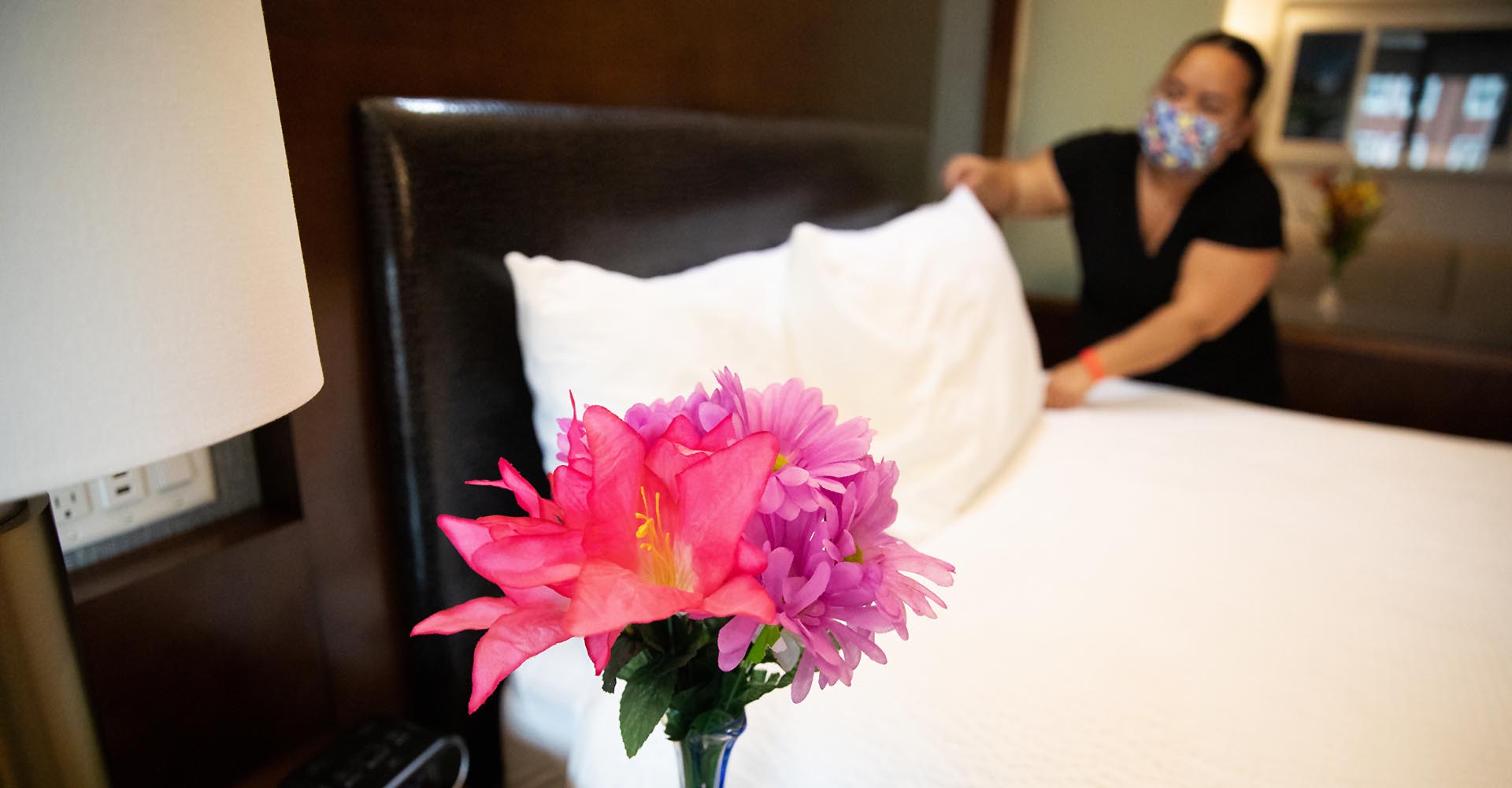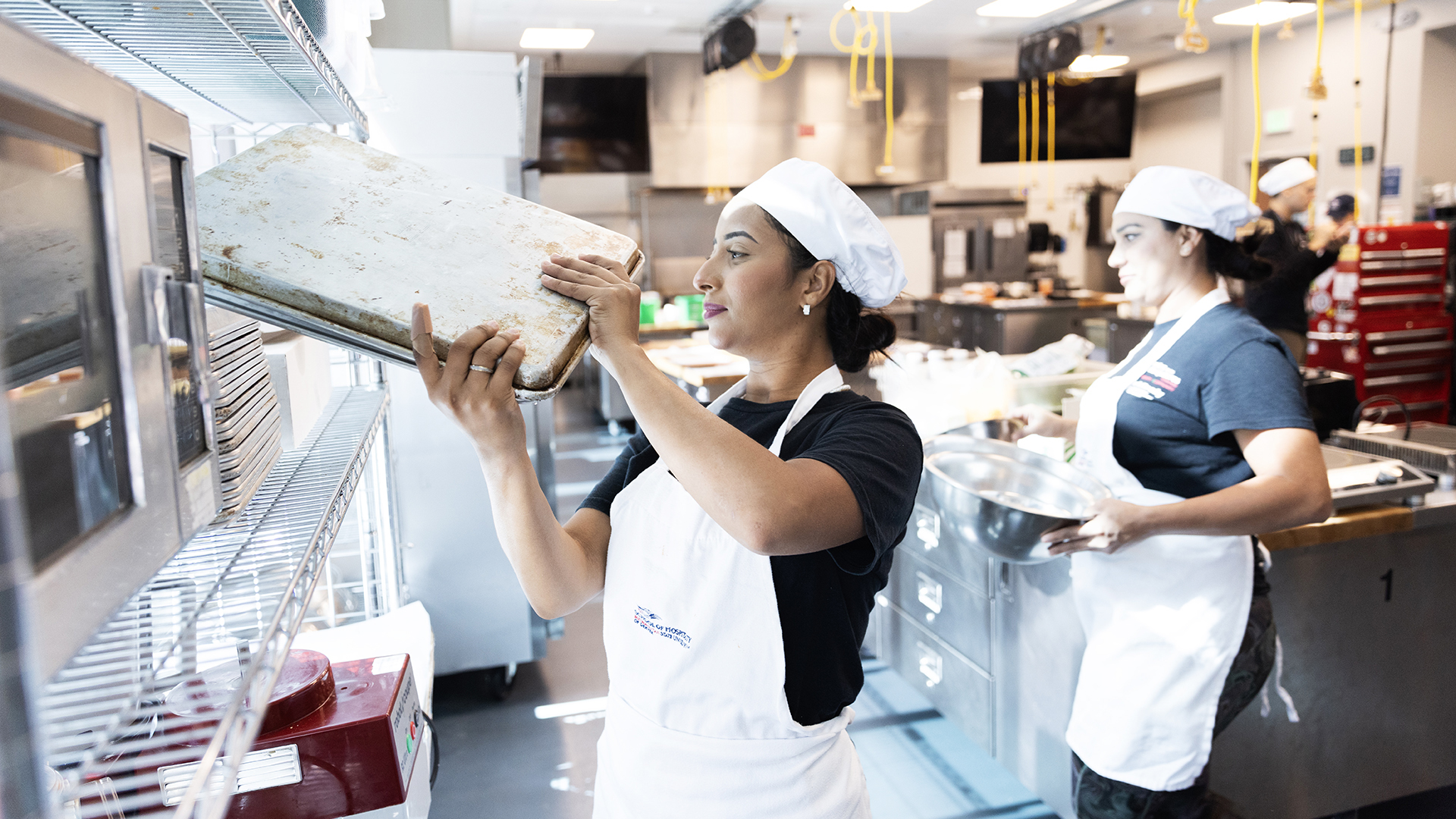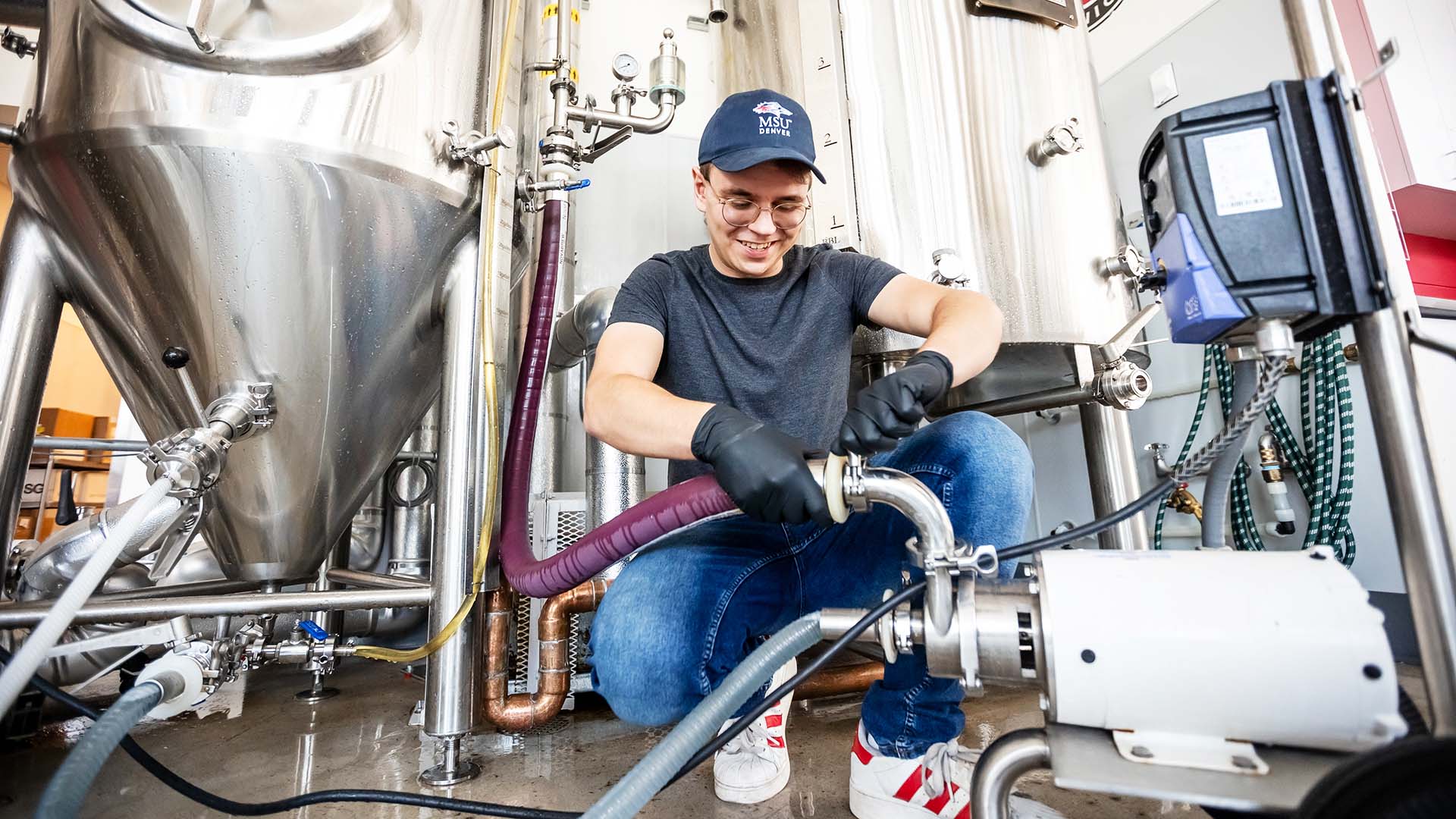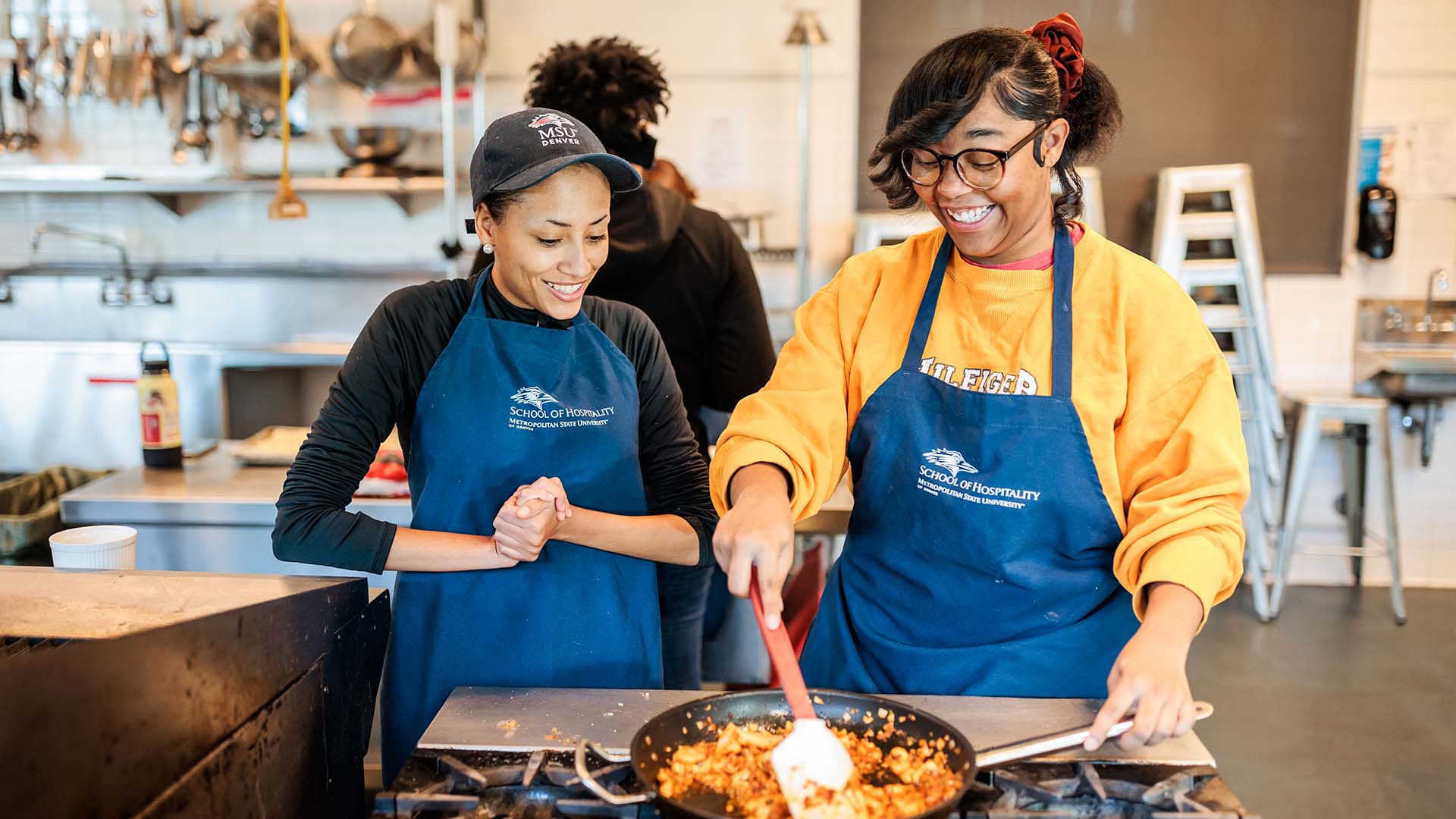Rooms to grow
The pandemic hit hotels hard. Here’s how Roadrunners have risen to guide the hospitality industry through the challenges of today and the promise of tomorrow.

As 2020 began, things were looking up for Scotti Gladney and his team at the SpringHill Suites by Marriott Denver Downtown.
The hotel, which also functions as a learning laboratory for students in Metropolitan State University of Denver’s School of Hospitality, had just been remodeled, and Gladney, the general manager, was excited to show it off to guests taking advantage of its enviable location.
Then the Covid-19 pandemic took hold, and the business travel that made up more than 60% of the hotel’s stays disappeared overnight.
In what is now an all-too-familiar story, the hotel responded by cutting expenses, deferring payments to stay afloat and ramping up safety measures. Gladney was forced to shrink his team of 70 associates down to 15.
“No doubt about it, it’s been difficult,” said Gladney, who also teaches classes on management and operations in MSU Denver’s School of Hospitality while pursuing his master’s in business administration. “But we’ve been able to adopt contingencies and are set up to perform well in delivering our services. I do believe when we come back, we’ll be back on top.”
Exactly when the hospitality industry will come back remains an open question. Hotels were one of the first sectors affected by the Covid-19 pandemic, and the American Hotels & Lodging Association predicts hospitality will be among the last to fully recover. But Colorado industry insiders say the lessons that hoteliers learned during the downturn, coupled with pent-up demand for travel, position the state’s hospitality sector for a faster bounce-back that will create new jobs for skilled professionals.

“Everyone’s taking a hit right now, but (the hospitality industry is) not going anywhere. Not just that — it’s going to come back with an unbelievable ferocity,” said Christian Hardigree, J.D., dean of MSU Denver’s School of Hospitality.
Local and limited regional travel will be the first to return as vaccine rollout peaks, she predicted. That means lower- to mid-tier roadside accommodations and consumer-to-consumer rentals (think: Airbnb and VRBO ) may benefit first. Hardigree further anticipates this to continue throughout 2022, with longer-distance and international travel returning to pre-pandemic levels in the first or second quarter of 2023.
As vaccine distribution increases and people become more comfortable traveling again, there will be pent-up demand for tourism and events, said Eric Olson, Ph.D., MSU Denver’s inaugural Rita and Navin Dimond Hotel Management chair. Among the programs Olson will oversee is the prestigious Rita and Navin Dimond Fellows Program, made possible by a generous 2014 gift by Rita and Navin Dimond, founders of Stonebridge Cos., a Denver-based, privately owned hotel owner, operator and developer.
“The fundamental need to connect with others through travel — going for a meal at a restaurant, going to a conference or sporting event or going to a local brewery — will only increase in the upcoming years,” Olson said. “At the heart of hospitality is the opportunity to provide service for guests; that will never go away.”
Adaptation fuels job creation
The pandemic year has been the hardest of Aaron Alberding’s professional life.
In March 2020, the general manager for Stonebridge Cos.’ Doubletree by Hilton Denver Tech Center and 2001 MSU Denver hospitality graduate was forced to lay off 130 associates.
“I went from strategic business decision-making to bartending, emptying trash and cleaning bathrooms — whatever it took to keep things going,” he said.
As travel to Colorado, which has been recognized as one of 2021’s hottest destinations by National Geographic, Harper’s Bazaar and the Points Guy, takes off, demand will create jobs for more skilled hospitality professionals, Olson said. The industry won’t just rehire for the housekeeping and restaurant positions Alberding filled during the pandemic. Olson anticipates new jobs to proliferate in sectors such as virtual experiences and health and safety.

Hospitality companies will continue to innovate in the areas of safety, health and enhanced cleanliness protocols, which will create new jobs, Olson said. The future of hotels may include positions overseeing health checks before meetings and events; managing touchless tech for check-in, check-out and other services; and marketing “vaccine passport” promotions to build confidence among guests.
The implications of the ongoing shift to remote employment will also create new opportunities, Hardigree said.
“That means more multipurpose, business-oriented spaces so you don’t have a bed in the backdrop of your Zoom calls,” she said. “You’ll probably also see this reflected in messaging like ‘Why work from home when you can work from Vegas?’”
Many hospitality workers opted for early retirement when the pandemic hit, Hardigree added, meaning more management jobs will be available as the industry rebounds. Indeed, as vaccines roll out, it’s not just those weathering the storm in hospitality who should be cautiously optimistic, she said, noting that MSU Denver’s School of Hospitality finished 2020 with its largest incoming class to date.
“We’re at the point where there’s a massive need to backfill those roles,” she said. “For younger professionals, what used to be an eight- to 10-year trajectory to move into management will likely be more like three to four years.”
Working today for opportunities tomorrow
Further afield, the ongoing integration of technology promises futuristic amenities for guests and jobs for future hospitality professionals. Think customizable digital art, or seamless Bluetooth integration for music and mood lighting the moment you step through phone-synced keyless sliding doors.
That last “Star Trek”-inspired element comes out of Gladney’s hotel-management class, where he asks students to envision what the hotels of tomorrow might look like.
“It’s all about making stays more productive, personable and memorable,” he said.

While he keeps his eye on the future, Gladney, like many in the industry, remains intensely focused on keeping his hotel vibrant today, and his efforts are being rewarded: Gladney was named SpringHill Suites by Marriott’s General Manager of the Year and made Hotel Management Magazine’s list of GMs to Watch. Perhaps most impressive, in the midst of the pandemic, SpringHill Suites by Marriott Denver Downtown remained profitable — good news for MSU Denver, which owns the property.
Gladney credits hotel management and ownership company Sage Hospitality and MSU Denver for staying the course and keeping the hotel’s Degree Metropolitan Food + Drink restaurant open.
For hospitality leaders such as Gladney, elevating the individual experience for guests and employees is proving to be just the shot in the arm needed.
“If you put fun at the center of everything, you bounce back faster when the bad days hit,” he said. “The hardest part of all of this is that I miss my team — but I truly believe we’re going to come out of this stronger than ever.”







